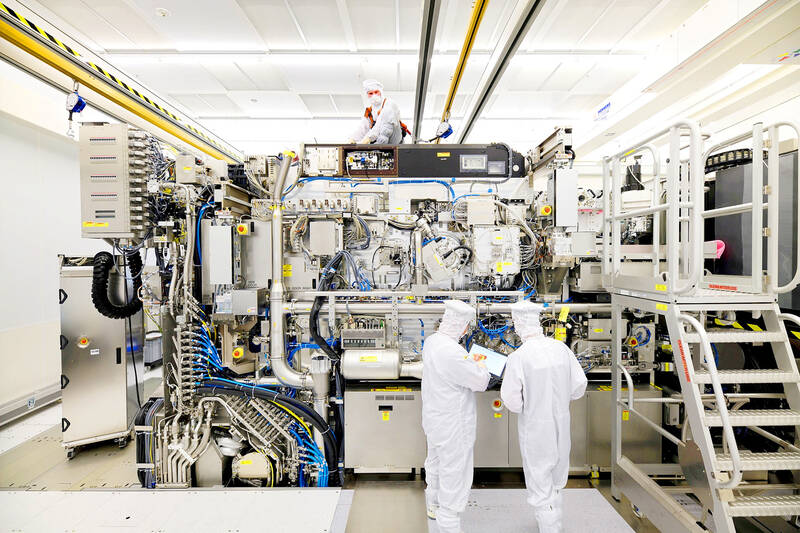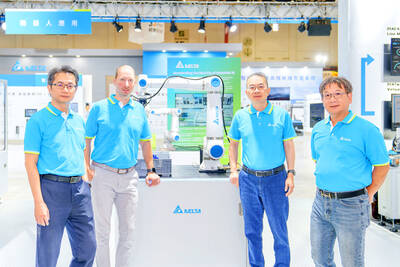The Netherlands’ defense ministry advised the government in 2020 not to allow semiconductor equipment supplier ASML Holding NV to export any of its most modern machines to China, Dutch newspaper Het Financieele Dagblad reported on Friday.
The FD obtained a slightly redacted version of the advice, which it has published on its Web site, via a Freedom of Information Act request.
“From the perspective of the Dutch military and security interests in the mid-to-long-term it is of importance ... that ASML not be granted any export permit for the delivery of EUV machines to China and that this unique technology be protected as much as possible,” the advice addressed to the foreign ministry said.

Photo: Bart van Overbeeke Fotografie/ASML/Handout via Reuters
EUV refers to ASML’s flagship extreme ultraviolet lithography machines, which cost US$200 million each and are used by chipmakers to create the circuitry of computer chips.
The advice has been heeded, as ASML has not shipped EUV technology to Chinese customers.
The publication comes as the Dutch government weighs additional restrictions on ASML’s exports of older equipment to China. Dutch Prime Minister Mark Rutte said on Tuesday that he expected a “good outcome” to discussions with the US on the matter after meeting with US President Joe Biden in Washington.
The letter also spelled out the potential risks of exporting the technology.
“The chance that a NATO member state in the future must defend itself against independently produced weapons systems would become much larger if EUV machines are exported,” the advice said. “In addition, our most important strategic security partner, the United States, has made an urgent appeal to the Netherlands not to export the EUV technology to China.”
ASML generates about 15 percent of its sales in China, an important growth market even after it was restricted from selling its most advanced machines there under US pressure in 2019.
The company declined to comment citing a quiet period ahead of earnings due on Jan. 25. ASML is expected to post fourth-quarter net income of 1.68 billion euros (US$1.82 billion) on record revenue of 6.37 billion euros, according to Refinitiv Eikon data.
In November last year, ASML raised its annual revenue estimates by 25 percent to at least 30 billion euros by 2025. The company’s top customers including Taiwan Semiconductor Manufacturing Co (台積電), Samsung Electronics Co and Intel Corp, who are engaged in major expansions, so any loss of Chinese sales could initially be offset elsewhere. Still, the US restrictions are expected to impact 5 percent of ASML’s 38 billion-euro order backlog.
There could be further losses from tougher Dutch rules, if for example, limits are reapplied to sales to China of older technology like deep ultraviolet lithography (DUV) equipment.
ASML has sold more than 8 billion euros worth of such equipment in China since 2014, when DUV was removed from international lists of goods deemed of possible military use.

SETBACK: Apple’s India iPhone push has been disrupted after Foxconn recalled hundreds of Chinese engineers, amid Beijing’s attempts to curb tech transfers Apple Inc assembly partner Hon Hai Precision Industry Co (鴻海精密), also known internationally as Foxconn Technology Group (富士康科技集團), has recalled about 300 Chinese engineers from a factory in India, the latest setback for the iPhone maker’s push to rapidly expand in the country. The extraction of Chinese workers from the factory of Yuzhan Technology (India) Private Ltd, a Hon Hai component unit, in southern Tamil Nadu state, is the second such move in a few months. The company has started flying in Taiwanese engineers to replace staff leaving, people familiar with the matter said, asking not to be named, as the

The prices of gasoline and diesel at domestic fuel stations are to rise NT$0.1 and NT$0.4 per liter this week respectively, after international crude oil prices rose last week, CPC Corp, Taiwan (台灣中油) and Formosa Petrochemical Corp (台塑石化) announced yesterday. Effective today, gasoline prices at CPC and Formosa stations are to rise to NT$27.3, NT$28.8 and NT$30.8 per liter for 92, 95 and 98-octane unleaded gasoline respectively, the companies said in separate statements. The price of premium diesel is to rise to NT$26.2 per liter at CPC stations and NT$26 at Formosa pumps, they said. The announcements came after international crude oil prices

STABLE DEMAND: Delta supplies US clients in the aerospace, defense and machinery segments, and expects second-half sales to be similar to the first half Delta Electronics Inc (台達電) expects its US automation business to remain steady in the second half, with no signs of weakening client demand. With demand from US clients remaining solid, its performance in the second half is expected to be similar to that of the first half, Andy Liu (劉佳容), general manager of the company’s industrial automation business group, said on the sidelines of the Taiwan Automation Intelligence and Robot Show in Taipei on Wednesday. The company earlier reported that revenue from its automation business grew 7 percent year-on-year to NT$27.22 billion (US$889.98 million) in the first half, accounting for 11 percent

A German company is putting used electric vehicle batteries to new use by stacking them into fridge-size units that homes and businesses can use to store their excess solar and wind energy. This week, the company Voltfang — which means “catching volts” — opened its first industrial site in Aachen, Germany, near the Belgian and Dutch borders. With about 100 staff, Voltfang says it is the biggest facility of its kind in Europe in the budding sector of refurbishing lithium-ion batteries. Its CEO David Oudsandji hopes it would help Europe’s biggest economy ween itself off fossil fuels and increasingly rely on climate-friendly renewables. While